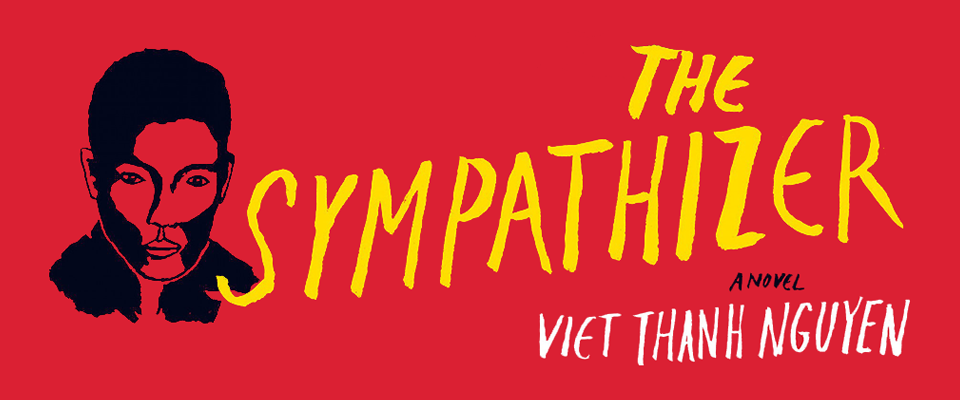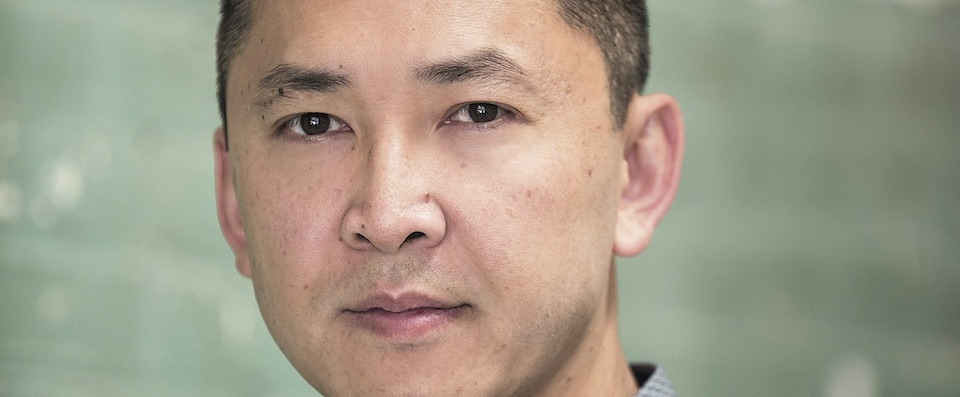For over 20 years—before 9/11 and Black Lives Matter and Trump’s wall-building scheme, before “white privilege” and “male privilege” were common phrases—Viet Thanh Nguyen was wrestling with questions of social justice and power. For years he dreamed of writing a novel that would explore these important concepts in a well-crafted, entertaining, even funny way. And that, in turn, would coax people to keep reading, even the parts that many Americans would like to ignore, and ultimately it would inspire them to look at themselves and the world with fresh eyes.
Of course, it would be cliché to say Nguyen wanted to write the Great American Novel to make the world a better place. And Nguyen is not normally a man of clichés. When he’s asked why he wrote his book The Sympathizer, Nguyen responds: “I don’t know … I guess I wanted to inflict as much pain as I possibly could on myself. I kept beating my head against the wall for years, trying and trying to be a writer, but my writing career was going nowhere. So I just hoped if I beat my head against the wall long enough and hard enough, I’d finally break through to the other side.”

How does it feel to win a Pulitzer? Nguyen’s response comes in softly, steadily and succinctly over the phone: “Good,” he says.
The Pulitzer committee praised The Sympathizer as “a layered immigrant tale told in the wry, confessional voice of a ‘man of two minds’—and two countries, Vietnam and the United States.”
Nguyen, who earned a Ph.D. from UC Berkeley and is currently a professor at the University of Southern California, was born in Vietnam. His family came to America as refugees in 1975, when he was 4 years old. Memories of the Vietnam War were fresh and strong in American culture and Nguyen would soon discover that these memories were filtered through one view of the experience; a filter that “marginalized the Vietnamese perspective.” It wasn’t a matter of him being bullied or teased because of his ethnicity. He doesn’t recall anything that overt happening while growing up in San Jose, even though the city still had a bit of a rough edge to it before the whole area emerged as Silicon Valley. The messages and feeling were more subtle. “It was a special sense of being ‘The Other.’” Nguyen explains.
Take, for example, Nguyen’s memory of being a young tyke who enjoyed his share of war movies. He was watching the ever-popular Apocalypse Now, getting caught up in the story, and suddenly found himself literally shaking from fright, grief and anger. He had been emotionally identifying with the protagonists, the Americans, and then there was a vivid scene in which these men massacred a group of innocent Vietnamese. It was a massive jolt for a young boy, and something he’s never forgotten.
In a recent interview, he commented that America has “made numerous movies about the Vietnam War that are not as artistic as Apocalypse Now but basically tell the same narrative of identifying with the Americans at the expense of the Vietnamese. It is also the narrative that makes up the bulk of American scholarship about the Vietnam War, the majority of American speeches from politicians about the Vietnam War and so on … all these different modes of representation—cinema, literature, political discourse—have reinforced these sorts of narratives that eliminate Vietnamese people.”
By the time Nguyen was a teen, he was attending an elite private high school. There was a group of Asian kids there and they gave themselves names like “The Asian Invasion” or “The Yellow Peril.” But aside from the light bravado, Nguyen says he still didn’t identify with being an Asian American at that point.
“Berkeley made me. It was a radically transformative experience for me. It blew my mind.”
After high school, Nguyen attended UC Riverside for a while, and then UCLA, and ultimately, Cal.
“Berkeley made me,” he says. “It was a radically transformative experience for me. It blew my mind.” Soon after learning that he won the Pulitzer Prize, Nguyen wrote a Facebook post and a message on his website in which he first thanked all the activists and minority writers who came before him, and then wrote: “Great love to Asian American Studies, to Ethnic Studies, to UC Berkeley, my alma mater that made me into the person that I am….”
Nguyen entered Cal as an English major but in time he added a second major in ethnic studies. “I was interested in social justice and the idea of eventually going to graduate school and studying and writing about things like romanticism just seemed so far removed from the real world … I just couldn’t justify it to myself to continue in that direction. But then, when I added ethnic studies, a whole new path opened up. I saw the connection between literature and the world and society. Through stories, the voiceless, the powerless, can be heard.”
The more he learned, the more he identified with being an Asian American. Even so, “I didn’t major in Asian studies, and instead, I chose ethnic studies. I liked the idea of coalitions and cooperation. How to come together. How to get past war.”
Nguyen once wrote: “I was turned on to this idea that literature matters by my professors at Berkeley, pioneering intellectuals like the late Barbara Christian, who could lecture passionately for hours on the history and literature of African Americans, without a lectern, without notes. And by Elaine Kim, who wrote the first book on Asian-American literature and showed that such a thing as Asian-American literature existed, and had been written by authors decades before Amy Tan. My professors were my role models because they showed to me that teachers, educators, and scholars played a crucial role in transmitting knowledge, preserving memory and cultivating a tradition that students can build upon.”
Inspired to create this kind of meaningful literature himself someday, Nguyen collected his Ph.D. and then headed south to USC, where he has taught in the English department and in the department of American Studies and Ethnicity. And when he could, Nguyen wrote. He wrote a couple of treatises and non-fiction articles and essays. He wrote a collection of short stories that didn’t go far. And he kept trying to write that novel. After securing two years off from his work as a professor, he sat down and wrote every day, until he created The Sympathizer.
The Pulitzer judges rarely select a debut novel for the prize, but this year, the judges cited Nguyen’s creation as “A gripping spy novel, an astute exploration of extreme politics, and a moving love story, The Sympathizer explores a life between two worlds and examines the legacy of the Vietnam War in literature, film, and the wars we fight today.”
The story begins at the end of the Vietnam War (which, by the way, Nguyen points out is called “the American War” in Vietnam). It is narrated by a wry double-agent of French and Vietnamese birth, who is a communist spy and a member of South Vietnam’s National Police. Thriller, spy novel and political satire, the book weaves history and insights into the tale of the narrator’s exile in Los Angeles. One of his adventures—and one of Nguyen’s favorite parts to write—is a biting, satirical section in which the narrator makes his way onto a movie set. Not coincidentally, the movie has a striking resemblance to Apocalypse Now.





















